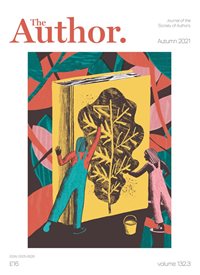 Hope and opportunity
Hope and opportunity
By James McConnachie
This issue focuses on two parts of our trade that are surprisingly neglected in the publishing industry. People don’t much like to talk about paid-for publishing. Yet ‘subsidy’ or ‘vanity publishing’, as it used to be dismissively called, is big business. It is also one of the major reasons that disappointed and distressed authors turn to the SoA for help. Sarah Shaffi introduces the findings of the survey commissioned by the SoA along with the Writers’ Guild of Great Britain and ALCS. They are shocking.
In response, SoA Chief Executive Nicola Solomon has called on the Publishers Association – which allows paid-for publishers to be members – to take urgent action. The SoA has also published a list of 15 principles, asking that all bona-fide paid-for publishers sign up to them. They include the provision of typical sales figures and clear contracts, the acquisition of time-limited rights, and an end to upselling. People who pay to have their books published are authors too. Those of us who earn royalties or fees stand in solidarity with them.
The secondhand book trade is also strangely overlooked. Perhaps authors and publishers prefer not to contemplate it – all those books considered unworthy of being kept, none of them earning us any money. The recent launch of the AuthorShare compensation scheme has changed that, though as yet it only includes a few retailers. The scheme raises hope, however, that authors might one day routinely earn from secondhand book sales. But how much hope? As George Walkley points out, in his article, the secondhand book market is so neglected that nobody knows how big it is. To redress that, he combines research with some clever inductive reasoning. It turns out there is quite a lot of hope out there.
Hope and opportunity are themes in this Autumn issue. Sarfraz Manzoor describes how his new book on Muslim and non-Muslim relations, They, helped him move from despair to optimism. Ronke Lawal finds new opportunities for authors to network effectively and enjoyably, post-Covid. Adam Steiner navigates the maze of seeking permission to quote, finding alternative routes for those tricky moments when quotation is not possible.
Nadifa Mohamed, meanwhile, reacts to the extraordinary research finding that 93% of writing studied for GCSE English is by white men. For Black writers, she suggests, this can create a feeling of obligation to explain and educate, which can distort the creative impulse. Somehow, she finds ways to write ‘narratives that enrapture me, that inhabit me in a way that feels natural and unbidden’ while ‘filling in the silences and absences where people like us should have been seen and heard.’
But I want to end with something less positive. Andrei Khadanovich’s ‘letter from Belarus’ reports on the conditions under which authors and other Belarusian citizens live and work. Comparing the situation there with the nightmarish visions of George Orwell and H.G. Wells, he describes how it feels to live in a state that curtails  fundamental freedoms – where journalists and bloggers have been attacked and illegally arrested, and where editors and writers can be arbitrarily sacked or blacklisted, their works withdrawn from schools.
fundamental freedoms – where journalists and bloggers have been attacked and illegally arrested, and where editors and writers can be arbitrarily sacked or blacklisted, their works withdrawn from schools.
Nicola Solomon visited Minsk in 2018 as part of a delegation from the European Writers’ Council, and the SoA has written to the Foreign Secretary, Dominic Raab MP, asking him to protest against state violence and request that political prisoners be released. We will continue to offer what support we can.
It strikes me that Khadanovich’s letter, however dark, is not altogether without hope. Belarusians, after all, are still finding the strength to resist.
James McConnachie
mcconnachie.tumblr.com | @j_mcconnachie
Cover artwork by Dionne Kitching
Dionne Kitching is an illustrator based in Manchester. She likes to make conceptual illustrations with lots of handmade textures and bright colours. Dionne primarily works in editorial and publishing, and has an MA in visual communication from Kingston University. Instagram: @dionnekitching / dionnekitching.co.uk
In this issue
HOPE & OPPORTUNITY
Pay to play – Sarah Shaffi reports on new paid-for publishing survey
High hopes – Sarfraz Manzoor on adapting to circumstances
A fair share in the circular economy – George Walkley examines the secondhand book market
Q&A: Dionne Kitching – This edition’s cover artist
FEATURES
0.1% – Welcoming new narratives, by Nadifa Mohamed
Little Nell is very much alive – Lauren James on the serialisation of novels
Ask an Author: Val McDermid – A chat with the Scottish crime writer
AUTHOR LIFE
The unwritten word – Using lyrics in non-fiction, by Adam Steiner
Reasonable doubt – Kia Abdullah on writing courtroom dramas
The reluctant networker – Ronke Lawal offers advice
Grub Street – Andrew Taylor’s quarterly digest
FROM THE SOA
Letters to the Editor
A Belarusian dystopia – Letter from Belarus
Spotlight: SoA groups and networks – Latest activities and updates
News – New era for the SoA, membership rates & more
Welcome, new members
Services for authors